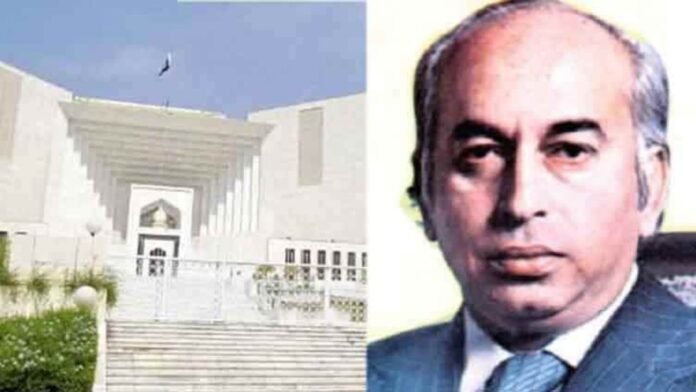Islamabad: A person who was not guilty was executed without a fair trial. The Supreme Court gave its detailed opinion on the presidential reference concerning Zulfiqar Bhutto’s hanging, thus exposing one of Pakistan’s most controversial judicial decisions.
Chief Justice Qazi Faez Isa wrote a 48-page opinion that sets out the political and legal background to the execution of former prime minister of Pakistan Zulfiqar Ali Bhutto. The opinion strongly hints that Bhutto’s execution served General Zia-ul-Haq, the military dictator then in power. It says that General Zia-ul-Haq needed to ensure his continuance and consolidation of power by hanging Bhutto. If released, Zulfikar Bhutto could initiate high treason proceedings against Zia-ul-Haq and pose a severe threat to his regime.
The opinion also touches on the conduct of Bhutto’s trial, bringing out issues about martial law during this period. During Bhutto’s trial, martial law in Pakistan undermined the judiciary’s constitutional authority. Judges followed military regime orders, and the government and its courts were captive to martial law. This situation raises doubts about the fairness of Bhutto’s trials.
The other thing is the view expressed here regarding judges who swore allegiance to dictators. According to this criticism, such courts are not people’s courts. This observation is very relevant, considering how much independence the judiciary lost during Bhutto’s trial, where justice should have been delivered but never was. When an autocratic ruler controls any part or aspect thereof, directly or through proxies, such an institution loses credibility and fails to dispense justice.
Justices Jamal Mandokhail and Hasan Azhar Rizvi concurred with. Chief Justice Isa’s opinion adds weight to the detailed critique of Bhutto’s trial and execution. Their agreement underscores a broader consensus within. The Supreme Court regarding the flaws in the judicial process that led to Bhutto’s execution.
However, in its detailed opinion, the Supreme Court also clarified its limitations regarding the presidential reference. The court unequivocally stated that it is neither hearing an appeal nor reviewing Bhutto’s case. The constitution or law does not provide a mechanism to nullify the sentence through such a reference. The opinion emphasized that after the Supreme Court dismissed a review petition, Bhutto’s sentence became final and conclusive. Therefore, a presidential reference cannot overturn a decision that has become final.
In this case, the Supreme Court’s in-depth opinion has profound implications for the historical and legal understanding of Zulfiqar Bhutto’s hanging. It recognizes that political manipulation influenced Bhutto’s trial, and compromised judges presided over it. It also points out that martial law affected the judiciary and made it dependent on it. However, it also points out that there are limits. How often can someone appeal or revoke a judgment?
This apex court judgment is essential to comprehend notions such as separation of powers and rule by law versus rule according to law. And the relationship between the judiciary and executive organs in Pakistan. It reminds us about the need for an independent judiciary and fair trials, especially in political cases. The detailed criticism against the execution of Bhutto, combined with the acknowledgment of constraints posed by. The existing legal system exposes one of the most dramatic chapters in Pakistan’s judicial history.


